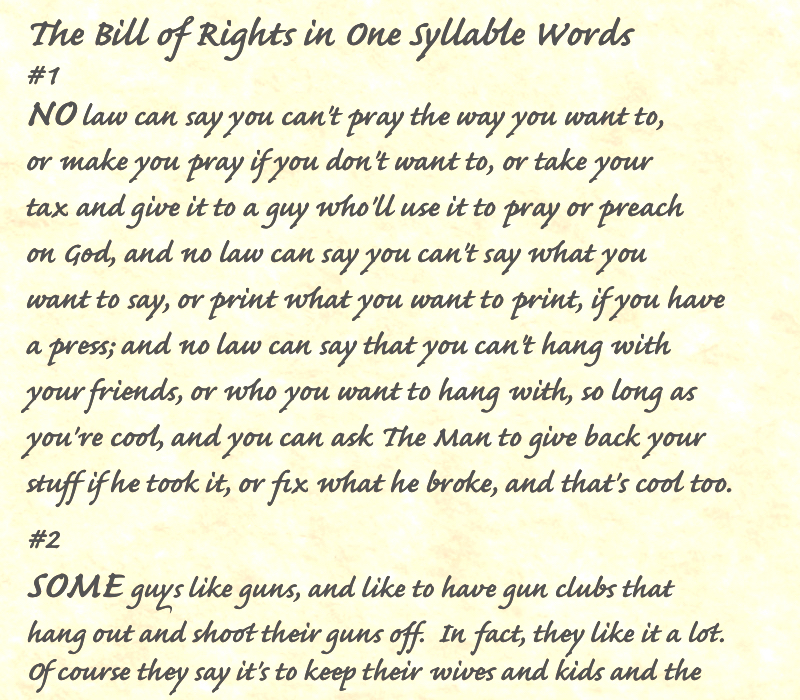 I
I
No law can say you can’t pray the way you want to, or make you pray if you don’t want to, or take your tax and give it to a guy who’ll use it to pray or preach on God, and no law can say you can’t say what you want to say, or print what you want to print, if you have a press; and no law can say that you can’t hang with your friends, or who you want to hang with, so long as you’re cool, and you can
ask The Man to give back your stuff if he took it, or fix what he broke, and that’s cool too.
II
Some guys like guns, and like to have gun clubs that hang out and shoot their guns off. In fact, they like it a lot. Of course, they say it’s to keep their wives and kids and the rest of us safe in case The Man gets all up in their face, or gets in a war. Hey, that’s cool.
III
The Man can’t stay at your place if you don’t ask him to, and that means his friends can’t, and he can’t send them.
IV
The Man can’t come in your place or send the heat to come in there and see what’s what, and look at all your stuff, and go through your house and shit, and poke ’round just cuz he feels like it. If he thinks you’ve got some bad shit or if he thinks you’ve done some crime and he needs to look in your stuff to see if you did, then he has to ask a judge to let him in to check out your shit and see if it’s bad, or see if it proves you did a crime, and then if the judge says yes that’s the way The Man can come in. Oh, and The Man has to tell the judge why up front, and that has got to be good, or else no go.
V
The Man can’t charge you with a crime till a bunch of folks who meet just to bust guys for crimes, or else a judge, say they think it’s true that you might have done it, but if you and/or The Man are in a war, or if you’ve been to boot camp and could be in a war, then you’re screwed. If you get off, The Man can’t bust you for the same thing twice. The Man can’t make you rat on your own self. You can clam up and not say a word and that’s cool. The Man can’t take your house or your land or your car or your stuff, as a fine for some crime, or put you in jail, till a judge thinks The Man was fair. The Man can take your yard to make a wide road or a new park but he has to pay. Not through the nose, just pay.
VI
If there’s a crime and The Man thinks you did it, he has to try you fast or else you might get off. He has to tell you which crime it was, and why he thinks you did it, and show you what he’s got on you, and you get to force the heat, and guys you want in court, to come and tell what they know and why they might doubt that you did it, or why they might just think that you are clean; you have a right to get your own guy to talk up your case and say The Man is wrong, and why the law should get you off, and if you’re poor The Man has to pay him; then twelve guys have to vote, twelve to zip, that they all think The Man proved that you did it, to send you up.
VII
If the schmuck next door shafts you and you sue him, you get to sue him in The Man’s court if you want at least two times ten bucks from the schmuck, and you and the schmuck both have the right to make twelve guys (in some states six guys, and that’s cool) vote on who was right and who was wrong and who pays, and when the twelve guys (or six guys) say what the facts were, no judge can change that.
VIII
The Man can’t charge too much bail, or fines that are too big, or treat you too bad when you’re in jail, but if you offed a guy and The Man offs you for that, most courts think that’s cool and we can’t do shit for you.
XIX
There is some stuff The Man can’t do. That means that you have some rights that ain’t here.
X
Some stuff The Man can’t do, the states can do; and some stuff The Man can’t do, can’t be done. But we don’t say what the states can do, or what your rights are; we’ll make you guess for as long as we can.
The Bill of Rights, restated in words of one syllable, written by me in January 1997, lightly edited, and presented as a public service. © STEPHANIE VARDAVAS
XXX
Contrast and compare with the official text, courtesy Uncle Sam:
Amendment I
Congress shall make no law respecting an establishment of religion, or prohibiting the free exercise thereof; or abridging the freedom of speech, or of the press; or the right of the people peaceably to assemble, and to petition the Government for a redress of grievances.
Amendment II
A well regulated Militia, being necessary to the security of a free State, the right of the people to keep and bear Arms, shall not be infringed.
Amendment III
No Soldier shall, in time of peace be quartered in any house, without the consent of the Owner, nor in time of war, but in a manner to be prescribed by law.
Amendment IV
The right of the people to be secure in their persons, houses, papers, and effects, against unreasonable searches and seizures, shall not be violated, and no Warrants shall issue, but upon probable cause, supported by Oath or affirmation, and particularly describing the place to be searched, and the persons or things to be seized.
Amendment V
No person shall be held to answer for a capital, or otherwise infamous crime, unless on a presentment or indictment of a Grand Jury, except in cases arising in the land or naval forces, or in the Militia, when in actual service in time of War or public danger; nor shall any person be subject for the same offence to be twice put in jeopardy of life or limb; nor shall be compelled in any criminal case to be a witness against himself, nor be deprived of life, liberty, or property, without due process of law; nor shall private property be taken for public use, without just compensation.
Amendment VI
In all criminal prosecutions, the accused shall enjoy the right to a speedy and public trial, by an impartial jury of the State and district wherein the crime shall have been committed, which district shall have been previously ascertained by law, and to be informed of the nature and cause of the accusation; to be confronted with the witnesses against him; to have compulsory process for obtaining witnesses in his favor, and to have the Assistance of Counsel for his defence.
Amendment VII
In Suits at common law, where the value in controversy shall exceed twenty dollars, the right of trial by jury shall be preserved, and no fact tried by a jury, shall be otherwise re-examined in any Court of the United States, than according to the rules of the common law.
Amendment VIII
Excessive bail shall not be required, nor excessive fines imposed, nor cruel and unusual punishments inflicted.
Amendment IX
The enumeration in the Constitution, of certain rights, shall not be construed to deny or disparage others retained by the people.
Amendment X
The powers not delegated to the United States by the Constitution, nor prohibited by it to the States, are reserved to the States respectively, or to the people.
